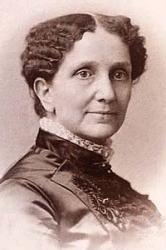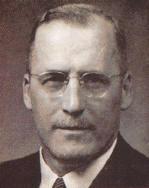
1821 - 1910 Author of "Mother's Evening Prayer" in Christian Science Hymnal (Rev. and enl.) Mary Baker Eddy (born Mary Morse Baker, July 16, 1821 – December 3, 1910) is the discoverer and founder of Christian Science, a religious movement that emerged in New England in the late 19th century. Eddy is the author of the movement’s textbook, Science and Health with Key to the Scriptures (first published in 1875), and founder of The First Church of Christ, Scientist (1892). She also founded The Christian Science Publishing Society (1898).
Mary Morse Baker was born in Bow, New Hampshire, the youngest of six children of Abigail and Mark Baker. Raised a Congregationalist, she came to reject teachings such as predestination and original sin, but she loved the biblical accounts of early Christian healing.
Mark Baker, Eddy’s father, firmly believed in the Congregational church’s doctrine of predestination, but Eddy couldn’t accept the idea that the loving God she knew could condemn people to eternal damnation. Eddy eventually joined the Congregational church at Sanbornton Bridge (present-day Tilton), New Hampshire, when she was seventeen.
A fragile child, Eddy suffered from a number of physical complaints. Her letters from this time, now at The Mary Baker Eddy Library in Boston, Massachusetts, portray her sufferings and search for relief. In an effort to find health in her early adulthood, she tried homeopathy, dietary cures, mesmerism, hydropathy, and other popular treatments of the day. None of those methods brought lasting health.
On December 10, 1843, Eddy married George Washington Glover. He died of yellow fever on June 27, 1844, a little over three months before the birth of their only child, George Washington Glover. As a single mother in poor health, Eddy wrote some political pieces for the New Hampshire Patriot, as writing was one of the few ways a woman in her position could make money.
Eddy continued to struggle with poor health, and her son was put into the care of neighbors by her father and stepmother. She married Dr. Daniel Patterson, a dentist, in 1853, hoping he would adopt the young boy. Patterson signed papers to that effect on their wedding day, but failed to follow through on his promise. In 1873, Eddy divorced Daniel Patterson on the grounds of desertion.
In October 1862, Eddy became a patient of Phineas Quimby, a magnetic healer from Maine. She benefited temporarily from his treatment. From 1862 to 1865 Quimby and Eddy engaged in lengthy discussions about healing methods practiced by Quimby and others. Eddy’s conclusions from her own scriptural study and healing practice differed from Quimby’s teachings. In 1866, Eddy had a substantial physical healing while reading about Jesus’ healings in the Bible, without employing any medical forms of treatment. This pivotal event showed her that Jesus’ teachings were practical throughout all time.
She devoted the next three years of her life to biblical study and called her discovery Christian Science. In her autobiography, Retrospection and Introspection, Eddy writes, “I then withdrew from society about three years,—to ponder my mission, to search the Scriptures, to find the Science of Mind that should take the things of God and show them to the creature, and reveal the great curative Principle,—Deity” (pp. 24–25). Eddy became well known as a healer, and first-hand accounts state that she performed miracles similar to miracles performed by Jesus.
In 1875, Eddy published her discovery in a book titled Science and Health (later retitled Science and Health with Key to the Scriptures), which she called the textbook of Christian Science. As worded in the final edition, she wrote, “In the year 1866, I discovered the Christ Science or divine laws of Life, Truth, and Love, and named my discovery Christian Science” (p. 107). During these years she taught her new ideas to hundreds of people. Many of her students became healers themselves. The final chapter of Science and Health, titled “Fruitage,” contains testimonies of people who were healed by studying her book.
In 1877 she married Asa Gilbert Eddy, a student of Christian Science and an active worker in the movement.
Eddy founded The Christian Science Journal in 1883, a monthly magazine “designed to put on record the divine Science of Truth” (The First Church of Christ, Scientist, and Miscellany, p. 353). Eddy founded The Christian Science Publishing Society in 1898, which became the publishing home for numerous publications launched by her and her followers. The Christian Science Sentinel, a weekly religious periodical written for a more general audience, and The Herald of Christian Science, a religious magazine with editions in many languages, were established in 1898. In 1908, at the age of 87, Eddy founded The Christian Science Monitor, a daily newspaper. These periodicals continue to be published today.
Five of Eddy’s poems were set to music and included in the Christian Science Hymnal during her lifetime: “Christmas Morn,” “Mother’s Evening Prayer,” “Christ my Refuge,” “Communion Hymn,” and “Feed My Sheep.” When the hymnal was revised in 1932, two more of her poems were added: “Love” and “Satisfied.” More information about these particular poems, their original publication and inclusion in the hymnal, is available from The Mary Baker Eddy Library.
Eddy died on the evening of December 3, 1910, at her home in Chestnut Hill, Massachusetts. Hundreds of tributes appeared in newspapers around the world, including The Boston Globe, which wrote, “She did a wonderful—an extraordinary— work in the world and there is no doubt that she was a powerful influence for good.”
Today, there are Christian Science churches in 76 countries.
This biography was written in collaboration with The Mary Baker Eddy Library and the staff of “Hymns 2016” on JSH-Online. More information about Mary Baker Eddy is available at MBELibrary.org. Submitted 8 August 2016.
Mary Baker Eddy




